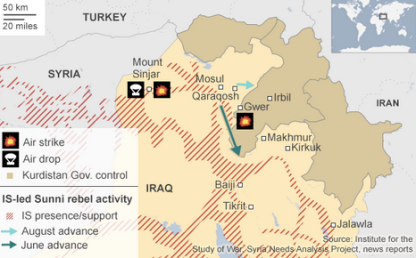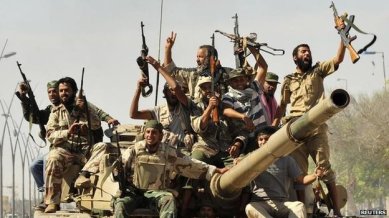Why are people in Hong Kong so angry?
Hong Kong has not seen a protest on this scale for years.
Those out on the streets have been angered by the Chinese government’s ruling limiting who could stand as a candidate in elections for Hong Kong’s leader, due in 2017.
At the heart of this is a civil disobedience movement launched by democracy activists Occupy Central. When China made its ruling, Occupy Central promised demonstrations.
Then students in Hong Kong began a separate class boycott in late September and when they broke into the main government compound on 26 September, Occupy kicked off its campaign early.
The police use of tear gas on supporters on 29 September further fuelled protesters’ anger. The initial sit-in at the Central district spawned more protests at Causeway Bay and Mong Kok, and a fourth site opened up at Canton Road days later.
Protesters have since called for the resignation of Chief Executive CY Leung for his handling of the situation, but the Chinese government has publicly pledged its support of his administration through the Chinese Communist Party newspaper People’s Daily.
What lit the fuse?
It was always unclear exactly how much support Occupy Central could count on. They say that when the demonstrations began a spontaneous outpouring helped boost crowds.
Tens of thousands of ordinary Hong Kong residents have taken to the streets, mostly young, but pensioners and young families have also been seen among those protesting.
Occupy Central say there is no single group in charge of the protests and that people refused to disperse even when they asked them to after the police let off teargas canisters.
How violent could it get?
Hong Kong rallies are generally peaceful and well-organised. But as Hong Kong’s politics has become more polarised so protests have become more confrontational.
Most witnesses report a peaceful and co-operative atmosphere, but tear gas has already been deployed so much may also depend on how the police responds to the crowds.
Occupy Central insists it is a non-violent movement, but the rapid growth of the student-led campaign could also change the dynamic.
Might the protest change China’s mind?
Before these protests began, activists admitted the movement was unlikely to sway China.
Public protests play an important role in Hong Kong. Locals have free speech and the right to protest, even though they cannot directly elect their government.
And they have used this right to effect in the past. A controversial national security law known as Article 23 was proposed in 2002, but dropped after large protests the following year. More recently, the government was forced into a U-turn on “patriotic education” classes.
The size and passion of these protests have taken observers by surprise, but the demands strike at the very heart of the nature of Beijing’s authority.
Demanding full democracy would radically change how Hong Kong is governed and China is unlikely to cave in on this – it would be seen as a dangerous precedent.
Does everyone agree with the protests?
No. There is a large spectrum of opinion in Hong Kong which analysts say appears increasingly polarised.
The campaigners and protesters want political reform and democratic elections that meet international standards.
But Hong Kong is also a business-minded city, and many will be reluctant to take part in civil disobedience, or anger Beijing, fearing it could hurt the economy.
On 3 October, anti-Occupy protesters began heckling the pro-democracy demonstrators at the Mong Kok site, which later escalated into scuffles and violence.
Who are the key players?
Occupy Central have led the way in campaigning for more direct democracy. Its leaders – law professor Benny Tai, sociologist Chan Kin-man and church minister Yiu-ming – are seen as moderate pro-democracy figures.
It is supported by many political parties in Hong Kong’s pan-democratic camp.
But in the last few weeks student leaders like Alex Chow and Lester Shum have come to the fore. Joshua Wong who was at the helm of the campaign against “patriotic education” and is also a force in these latest protests.
All three were arrested as the student demonstrations erupted but have since been released.
Pro-Beijing and pro-business parties tend to be against the campaign, and several anti-Occupy Central groups have also been set up. They claim to own the silent majority.
What are China’s biggest fears?
China does not want any movement that could be perceived as a challenge to its authority. Nor does it want a pro-democracy campaign spreading from Hong Kong to the mainland.
The fury in state media is palpable. It has accused”external forces” of meddling in Hong Kong’s affairs and encouraging “separatist sentiments”.
There has also been speculation over whether China would get involved in a crackdown. That would almost certainly be seen as an absolute last resort, given the likely international and business repercussions.
The demonstrations have been denounced by China.
So what happens next?
On 2 October, CY Leung offered to hold talks between the Hong Kong government and protesters, which student activists accepted.
But it remains to be seen if the dialogue will bear fruit. On 3 October pro-democracy leaders threatened to call off talks if the government did not adequately protect them from attacks by anti-Occupy groups.
To enable direct elections in 2017, the Hong Kong government will have to present a political reform plan to Hong Kong’s law-making body, the Legislative Council, for a vote. Pro-democracy lawmakers, who hold enough seats for a veto, have said that they will vote down any proposal based on China’s ruling.
If the proposal is voted down, Hong Kong will be unable to implement universal suffrage, and its elections are expected to proceed as before, with a committee of 1,200 mostly pro-Beijing figures selecting the leader.
Before any of this, however, it needs to find a way out of the current impasse on the streets.
Thanks for reading,
Digestible Politics


